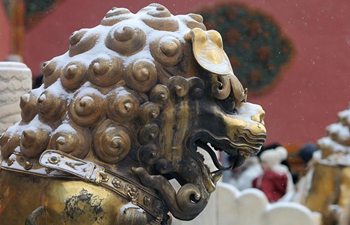HONG KONG, Feb. 18 (Xinhua) -- The Hong Kong University of Science and Technology (HKUST) announced on Monday that a new mechanism that could delay degeneration of injured nerves was found by its research team in collaboration with two institutions in the mainland.
The team consisting of scientists from the HKUST, Chinese Academy of Sciences and Jinan University discovered the new mechanism, bringing new hope to the treatment of nerve damage and neurodegenerative diseases such as Parkinson and Amyotrophic Lateral Sclerosis.
According to the team, axon is the long projection of a neuron/nerve cell that transmits electrical impulses to muscles and other nerve cells. Failure of axonal integrity may cause axonal dying back or retrograde degeneration of nerves.
A new gene Vps4 was identified to be effective in delaying the degradation of damaged nerves by the team.
Through a genetic screening in fruit flies, and later verification in rodents, the team used both in vitro and in vivo system to demonstrate that overexpressing Vps4 protein could delay the degradation of damaged nerves by up to three days.
This discovery marks an important breakthrough in understanding the molecular mechanism that regulates axonal integrity and possibly neurodegeneration, the team said.
Furthermore, Vps4 regulates autophagy, a process that removes damaged proteins and organelles to combat the negative effects of axon injury and neurodegeneration during aging. Depletion of Vps4 may induce autophagic impediment and lead to the subsequent axonal degeneration.
Liu Kai, professor from the Division of Life Science at HKUST and one of the leaders of the team, said in future studies, suppressing the rapid degradation of Vps4 may be an important direction and is expected to obtain stronger neuroprotective effects.
The finding was published in the scientific journal Science Advances.

















